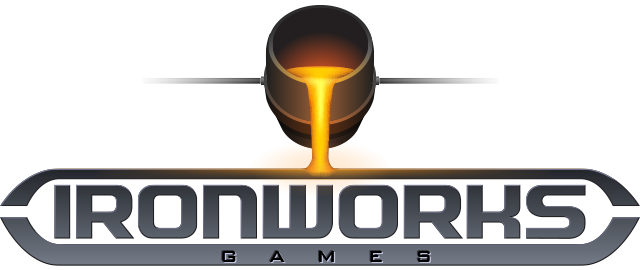Took me long enough, but who knew that contract programmers were in high demand? Everyone but me, it seems!
So Ironworks is officially a-go. Licences purchased, hardware bought, workspace set up, graveyard of coffee cups established.
So who are you, and what are you doing here?
I’m Nick, guy that likes games and pretty much everything to do with making ’em. Over the years I’ve been an artist, a programmer and dabbled in design and music, and now I’m going to take those things, mix them together, and make a whole product.
I’ve generally gravitated towards programming as a job because it allows me to get all deep and personal with a game; find out how it works, play with what makes it tick and finding creative solutions to difficult problems. However my real passion lies in gameplay mechanics, figuring out how a player interacts with a game and ways those systems can work together in concert to provide an interesting and memorable experience that people will want to play again and again.
I’ve been interested in pretty much all the disciplines that go into making a game, from architecture and lighting, to physics and music theory. I’ve played around in just about every part of a game that it’s possible to do, both professionally and in my spare time.
Also I’m here because this is my website, what a rude question.
What have you done before this?
Over the years I’ve been an artist, an animator, UI guy and sound guy, but most of my career has been working as a programmer for Atari, Krome and Firemonkeys. I’ve worked on various titles for both console and mobile, including Spyro: The Eternal Night, Star Wars: Force Unleashed, Mass Effect: Infiltrator, Need For Speed: Most Wanted and several others.
So why go independent?
Working under a large company comes with a lot of overheads. Ideas need to go through multiple levels of approval, resources need to be allocated, and people need to be paid. As a result, new and interesting ideas that may pose some level of risk tend to be shunned for blander, safer ideas to make sure that the investors keep the money coming in and people can keep their jobs.
Indies don’t have nearly the same overheads that a large company does and they don’t have a long line of managers, executives and investors to appease. This means they can take more risks, try more novel ideas, and play around with concepts that you just couldn’t hope to do in a corporate environment.
Games are still an incredibly young medium – only a scant 30 years old in the popular mind – and there are still vast landscapes of concepts that have yet to be explored. Exploring always has a high element of risk; you could go down the wrong path entirely and end up at a dead end or worse, but there’s also the chance you could also find fertile new lands to sow. When this happens, it reduces the risk for anyone that follows, allowing them to build on the knowledge of those before them, diversifying the landscape and improving life for everyone.
I may be a pioneer and have a town named after me, or I could be a warning and have a cliff named after me. Either way, without taking the risk, we’ll never know what we may have missed.
Also I can work in my pajamas.
What are you going to do?
Make games, of course! I have a game that I’ve been working on for a month or so (And been stewing in my mind for far longer) that will slowly be revealed as I work on it more, and I plan on updating this blog every week both as a form of motivation and to let people see how games are developed.
I also really like talking a lot when given half a chance.


